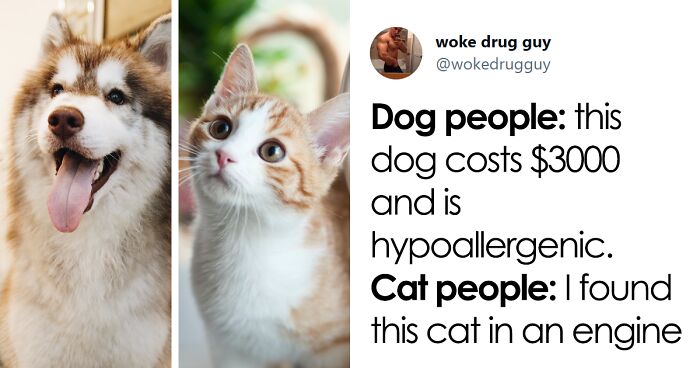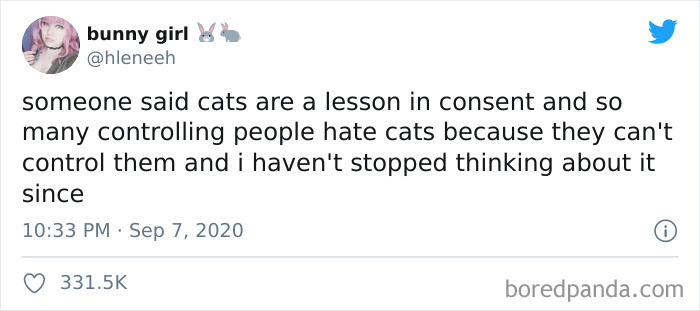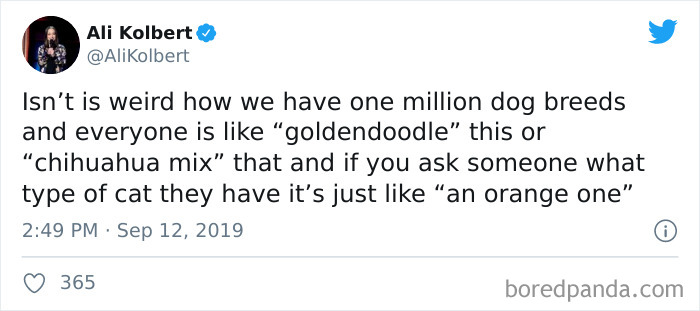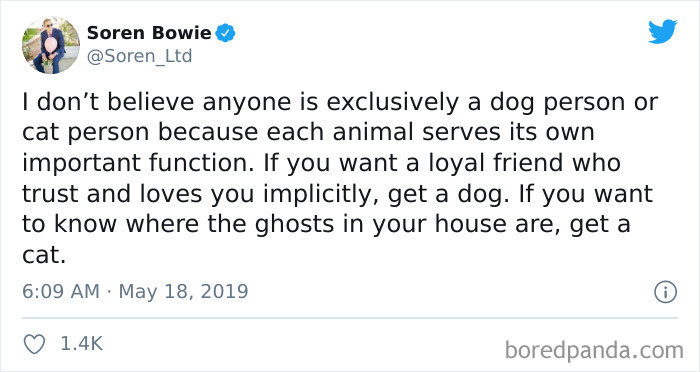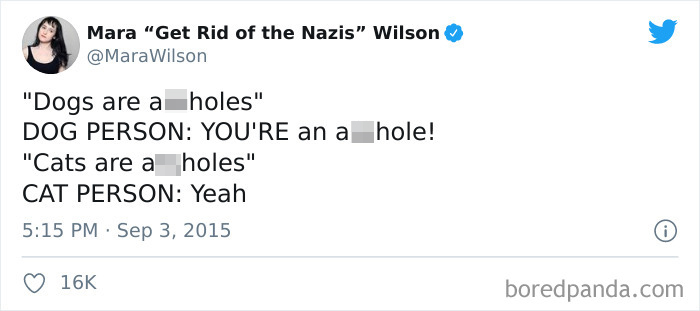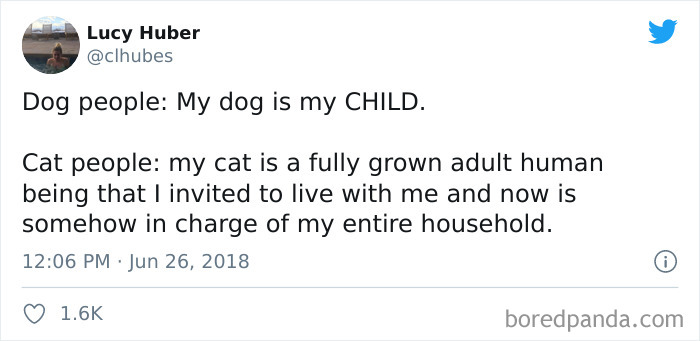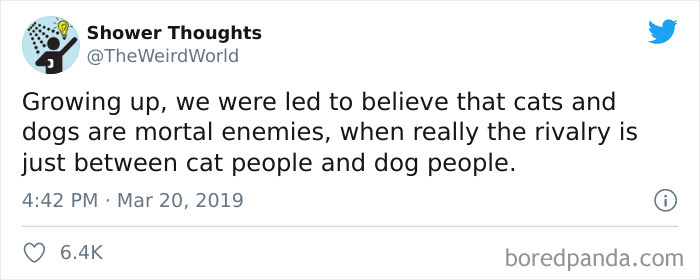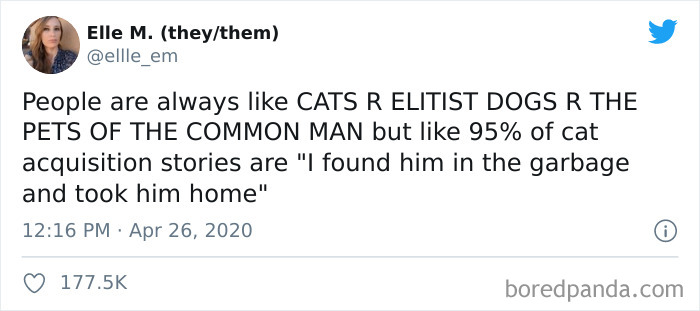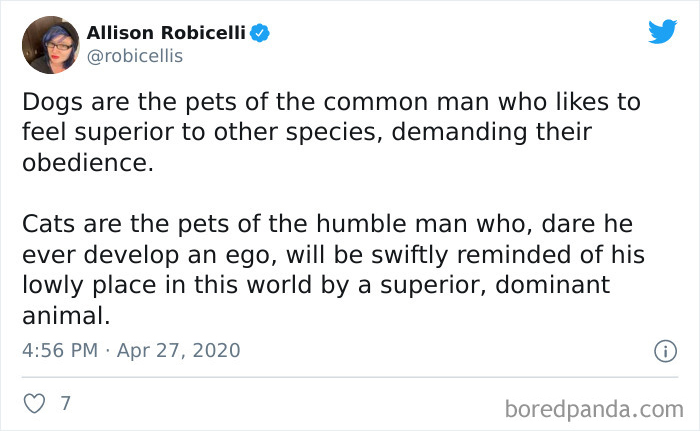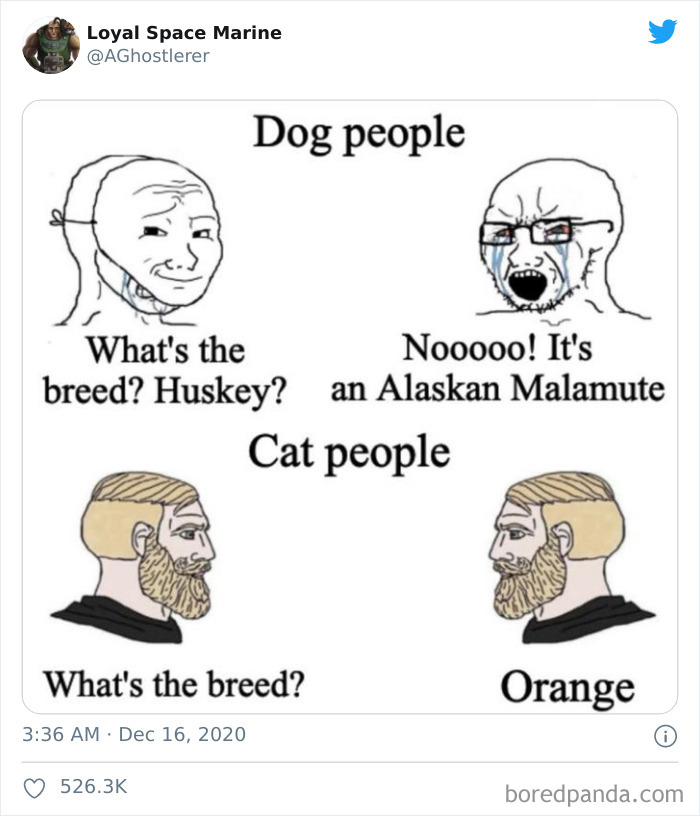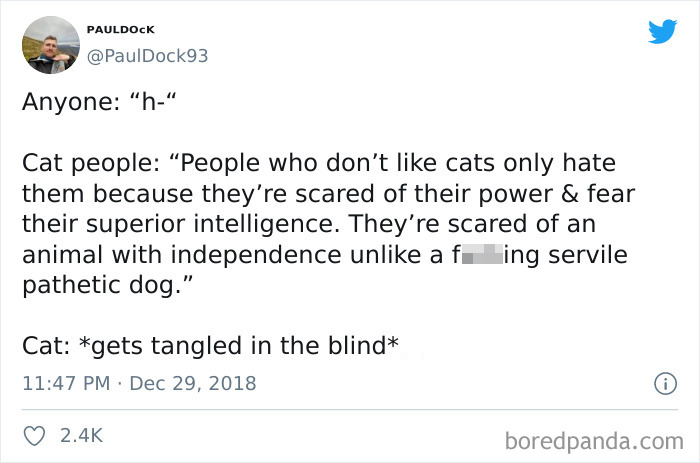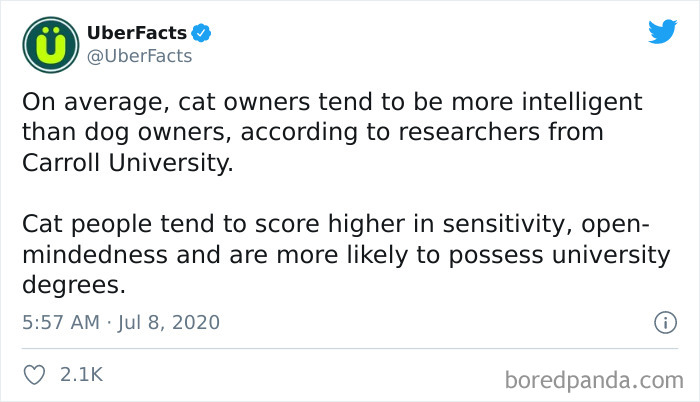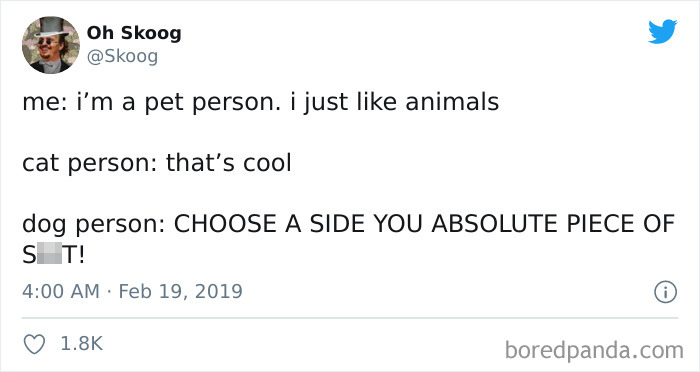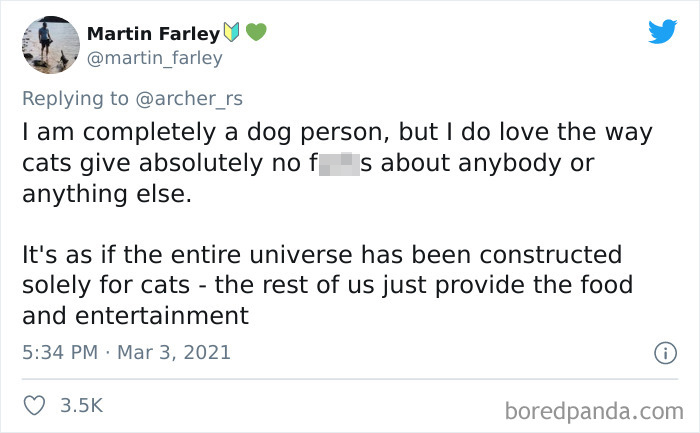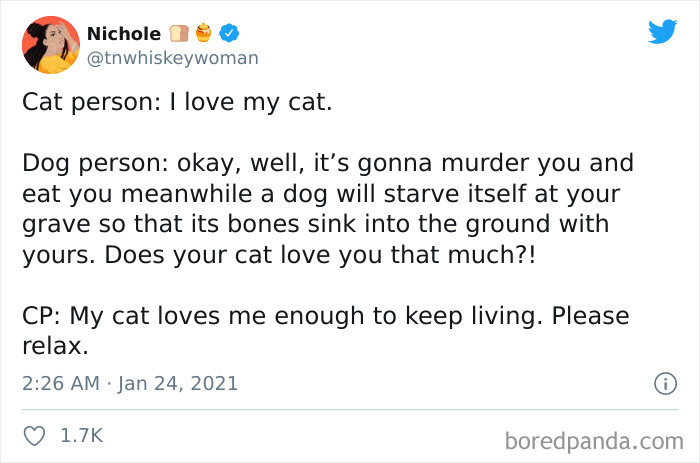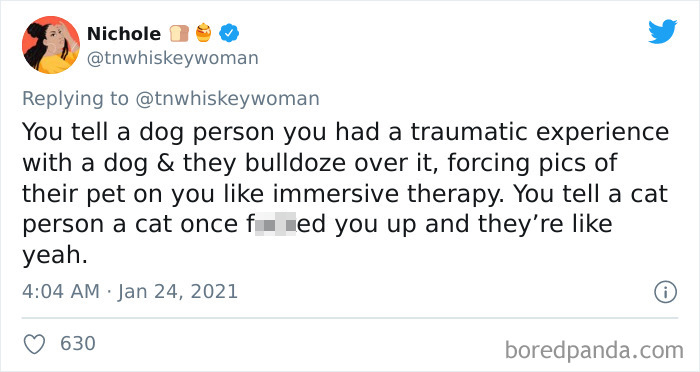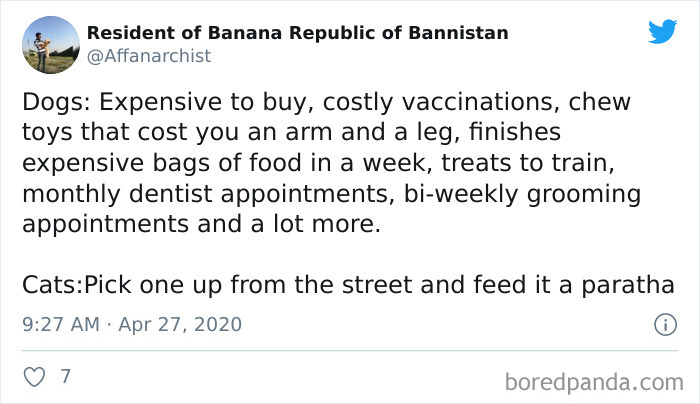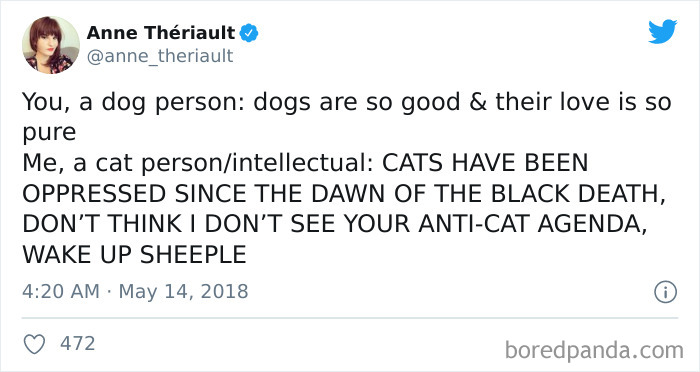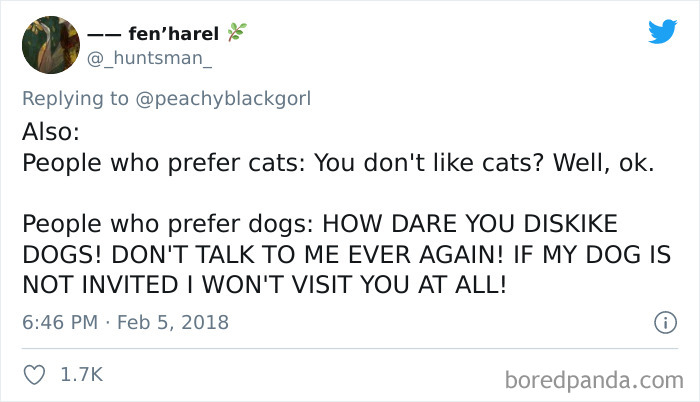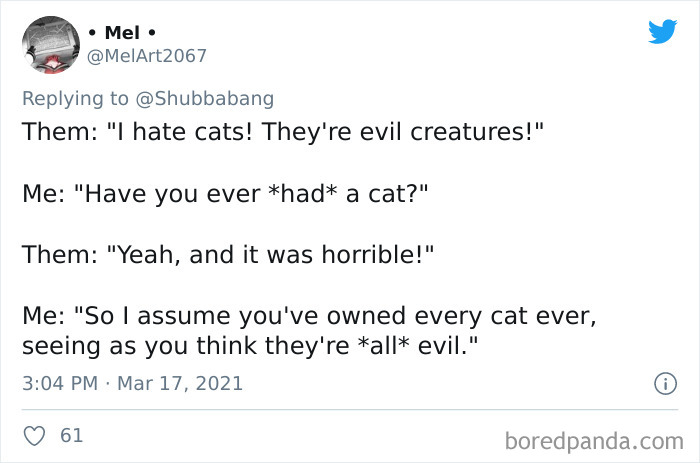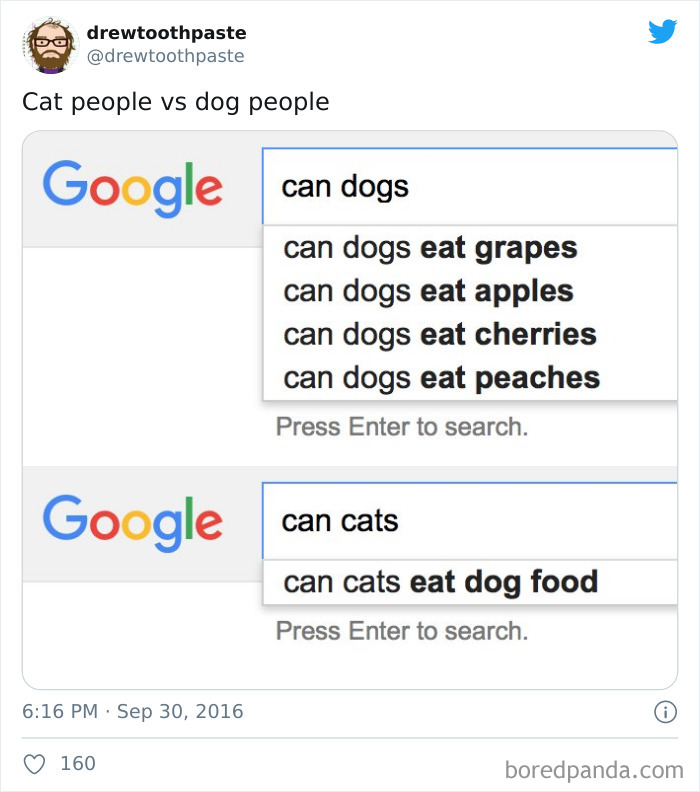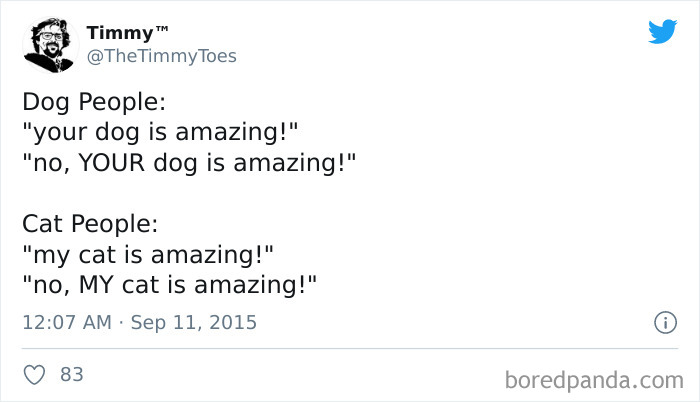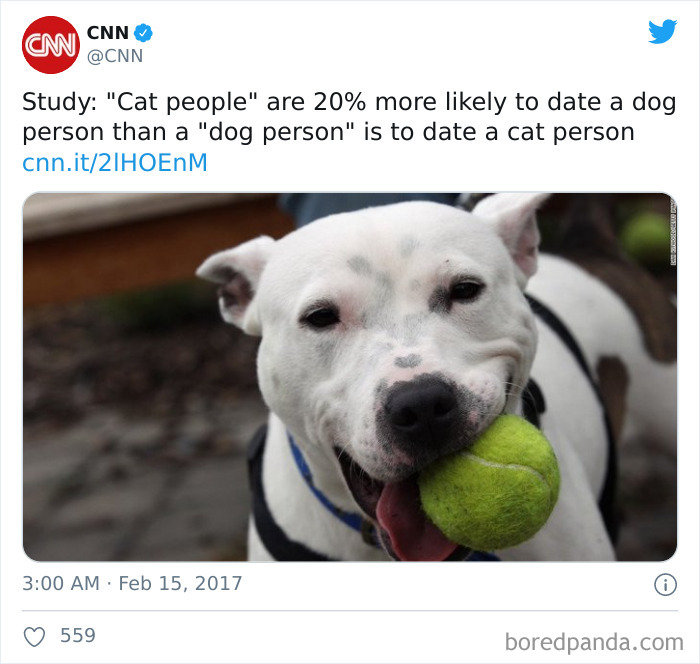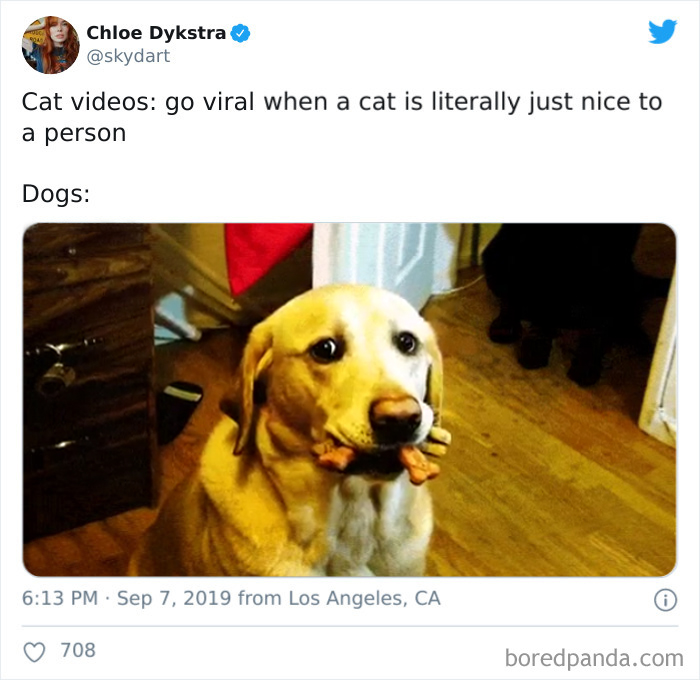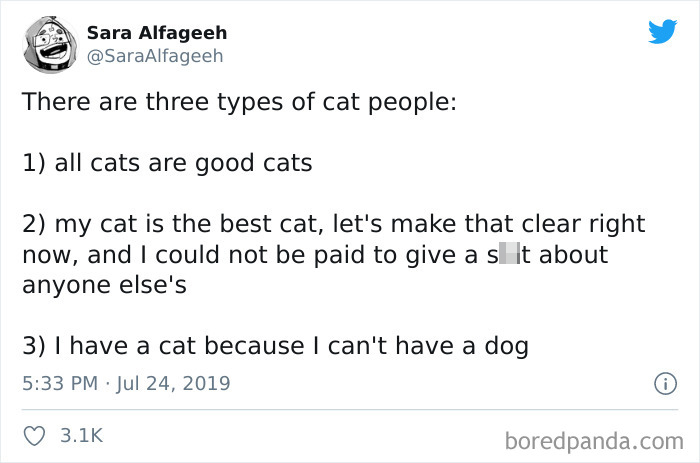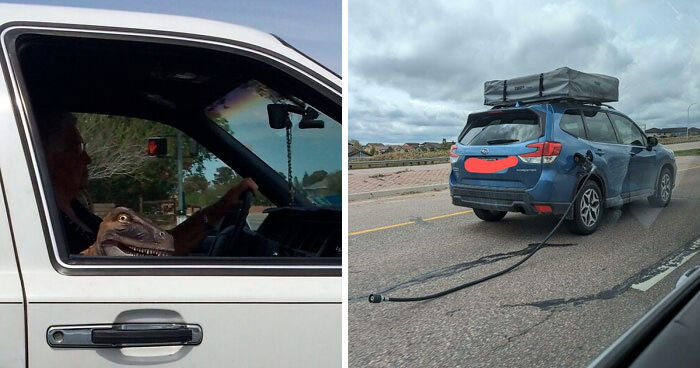Religion and politics are thought to be the underlying things that can make it or break it in this world when it comes to humans getting along with each other. But the differences don’t end there.
We have night owls and morning people, people who prefer yolk over egg whites, those who can curl their tongue and those who can’t. There are left-handed people and right-handed, and in the midst of the scale, you have cat people and dog people.
If you’re one, and every individual on this planet has a preference for dogs, cats, and rarely both, you’d know what that means. And if you've been living on the moon and still don’t know whether you’re a dog or a cat person, then this batch of tweets is just for you. So roll up your sleeves, ‘cause it’s about to get heavy.
This post may include affiliate links.
There’s been an ongoing debate on whether cat and dog people are really that different. And if we commonly agree on the fact that they indeed appear to have somewhat different personality traits, the question on what exactly separates them remains open to discussion.
So in order to find out what a person who spends more time with felines than many of us in lockdown spend with other human beings has to say on the discussion, we reached out to Molly De Voss. Molly is a certified feline behaviorist with a vision to reduce the number of cats euthanized in shelters, plus her cat intuition reigns supreme.
Molly said that in her personal observations, dog people “tend to be more 'outdoorsy' than cat people,” but she added: “that said, I like to hike—with my cat, of course.”
Moreover, “more women tend to own cats than men—partly because cats are seen as feminine and dogs more masculine; and partly because cats gravitate to women more because their voices are in a megahertz range similar to their meows.”
The feline behaviorist also noticed stronger feelings about cats since “more people (usually men) really dislike cats than they do dogs.”
“I think that may limit a single woman’s opportunities in the dating pool—especially if she has multiple cats. However, I have several male cat-owning clients who are neither gay, nor neurotic so obviously there’s no 100% stereotype that fits all,” Molly concluded.
To find out what the science has to say about this highly debatable topic, Bored Panda also reached out to Beatrice Alba, a lecturer in psychology at Deakin University and the co-author of a 2015 study on how dog people and cat people differ on dominance-related traits.
Beatrice told us that the bigger differences seem to be between people who self-identify as a "cat person" vs a "dog person." “But, of course, you don't have to choose between the two—plenty of people identify as both or neither. Having said that, although we found statistically significant differences between cat people and dog people on some psychological measures, the size of the effects were not huge.”
Beatrice’s study found that “dog people scored significantly higher than cat people on competitiveness, and a characteristic called Social Dominance Orientation. This is essentially a preference for hierarchy and the belief that some groups of people should dominate other groups of people.”
As a result, the creators of the study argued that “people prefer pets that complement their own personalities, so someone more inclined towards characteristics related to social dominance should prefer a more submissive pet, like dogs.”
Meanwhile, “Those who are not so attached to hierarchies and ranking highly within them may be more inclined to like cats, who we all know defer to no one,” Beatrice concluded.
Another recent study conducted by the psychologist Samuel D. Gosling and his colleagues at the University of Texas in Austin, in which 4,565 individuals were asked whether they were dog people, cat people, neither, or both, shed some light on these questions.
Gosling summarized his results, saying, "There is a widely held cultural belief that the pet species—dog or cat—with which a person has the strongest affinity says something about the individual's personality, and this research suggests there are significant differences on major personality traits between dog people and cat people."
Gosling’s research showed that dog people were generally 15% more extroverted, 13% more agreeable, and 11% more conscientious than cat people. The same research showed that cat people were 11% more open-minded than dog people.
A study led by Denise Guastello, an associate professor of psychology at Carroll University in Waukesha, Wisconsin, also showed somewhat similar results. People who said they were dog lovers in the study tended to be more lively—meaning they were more energetic and outgoing—and also tended to follow rules closely.
Cat lovers, on the other hand, were more introverted, more open-minded, and more sensitive than dog lovers. Cat people also tended to be non-conformists, preferring to be expedient rather than follow the rules.
Stanley Coren surveyed 6,149 people, aged 16 to 94. It included 3,362 dog owners and 1,223 cat owners, and the rest were people who had neither of them. “My results showed that people who owned only cats seemed to be somewhat different than dog owners, or people who owned both dogs and cats, in terms of their personalities. People who own both dogs and cats seem to be much like the people who own only dogs,” Stanley explained for Psychology Today.
His findings showed that cat owners “were one-third more likely to live alone than dog owners and twice as likely to live in an apartment or flat,” while dog owners were more likely “married, living in a house, and having children living in the home.”
When it comes to personalities, Stanley found that “people who own only cats tend to be relatively introverted (low on extroversion) and also reasonably cool (low in warmth or agreeableness).”
The author of the study explained further: “The general pattern that comes out of both studies is that dog owners are more social and interactive and cat owners (who own cats exclusively) are more introverted and self-contained."
On the other hand, it wouldn’t be right to generalize these findings and claim that they represent the full picture. Keep in mind that the dog and cat owners that were surveyed for studies represent only a fraction of society, and that any claims should be taken with a grain of salt.
The thing about dog/cat differences: Dogs have been with humans for ages (at least 15,000 years, maybe over 20,000), way back when all were hunter-gatherers; cats joined much later when humans turned to agriculture. The dogs' ancestors needed extensive breeding to be truly useful - they probably were somewhat dangerous like the wild animal pets of today (likely not as bad as tigers, but still) and ate the kind of prey/meat that humans ate. The cats' ancestors, on the other hand, already WERE useful by nature - there was no need to change their traits, meaning cats essentially domesticated themselves (seeking out settlements would have been an evolutionary advantage - lots of vermin to hunt). That likely also affected their approach to socializing - dogs were BRED to look up to humans, but cats just needed to warm up to humans. I swear they DO like humans, they just don't have that deep, desperate need for humans that was bred into dogs. But this lack doesn't equate hate!
They did seek out settlements! We have evidence of them doing that!
Load More Replies...Dog person as the dog chases the cat: "Oh, Fido is just playing!"...Cat person as the dog chases the cat: "WTF?! Call off your dog!"..;Dog person: "Oh, the dog won't hurt the cat!"... Cat person: Jumps between animals and gets three bruised ribs b/c the dog was just "playing". True story. My ribs. And I *like* dogs. But you don't let your dogs chase cats, b/c it is not a game. it is HUNTING.
I would like to say thank you. For saving that kitty's life.
Load More Replies...The thing about dog/cat differences: Dogs have been with humans for ages (at least 15,000 years, maybe over 20,000), way back when all were hunter-gatherers; cats joined much later when humans turned to agriculture. The dogs' ancestors needed extensive breeding to be truly useful - they probably were somewhat dangerous like the wild animal pets of today (likely not as bad as tigers, but still) and ate the kind of prey/meat that humans ate. The cats' ancestors, on the other hand, already WERE useful by nature - there was no need to change their traits, meaning cats essentially domesticated themselves (seeking out settlements would have been an evolutionary advantage - lots of vermin to hunt). That likely also affected their approach to socializing - dogs were BRED to look up to humans, but cats just needed to warm up to humans. I swear they DO like humans, they just don't have that deep, desperate need for humans that was bred into dogs. But this lack doesn't equate hate!
They did seek out settlements! We have evidence of them doing that!
Load More Replies...Dog person as the dog chases the cat: "Oh, Fido is just playing!"...Cat person as the dog chases the cat: "WTF?! Call off your dog!"..;Dog person: "Oh, the dog won't hurt the cat!"... Cat person: Jumps between animals and gets three bruised ribs b/c the dog was just "playing". True story. My ribs. And I *like* dogs. But you don't let your dogs chase cats, b/c it is not a game. it is HUNTING.
I would like to say thank you. For saving that kitty's life.
Load More Replies...
 Dark Mode
Dark Mode 

 No fees, cancel anytime
No fees, cancel anytime 


